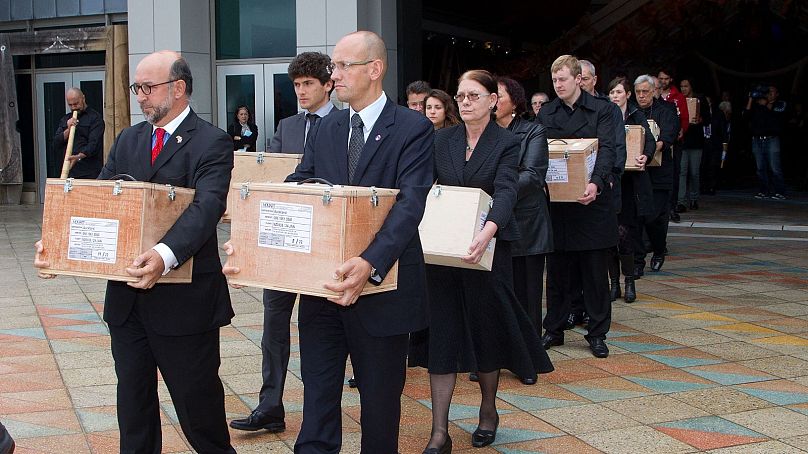The initiative is part of Germany's plan to return Indigenous artefacts looted or improperly acquired during colonial times to their homelands.
The remains of 95 Maori and Moriori people, including six mummified tattooed heads, will no longer be exhibited in seven museums and universities in Germany, thousands of kilometres away from their homeland, after they’ve finally made their way back to New Zealand today.
 ADVERTISEMENT
ADVERTISEMENT
 ADVERTISEMENT
ADVERTISEMENT
The move is part of Germany’s plan to return stolen or improperly acquired indigenous articles to their countries of origin. Back in May 2018 and 2019, Germany already returned to New Zealand a Maori skull which had been bought by a Cologne professor from a London dealer in 1908 and several artefacts which had been looted or traded in the 19th century.
The latest batch of ancestral remains arrived in New Zealand on Wednesday, according to the country's Ambassador to Germany Craig Hawke. A private ceremony attended by Hawke was organised in Germany to bid farewell to the remains as they embarked on the repatriation journey to “Aotearoa” -- the contemporary Maori language name for New Zealand.
Hawke remarked that the remains of the Indigenous people had spent “more than a century away from their homeland” and that their return showed the “mature and close relationship” between the two countries.
“Our relationship goes deeper than a traditional diplomatic relationship, to one of culture, science and knowledge exchange. These repatriations are a poignant example of our collaborative partnership,” Hawke said.
Once in New Zealand, the remains will be taken over by Te Papa, the country’s national museum, together with other artefacts and cultural treasures which were in Germany’s possession. They were previously owned by Germany’s Grassi Museum, Leipzig, the Reiss Engelhorn Museum, Mannheim, Linden Museum, the Stuttgart State Museum of Natural History, the Georg August University in Gottingen, the Roemer und Pelizaeus Museum, Hildesheim, and Museum Wiesbaden.
Te Papa announced that the remains were welcomed back home with a special repatriation ceremony.
“As we celebrate 70 years of diplomatic relations between Aotearoa New Zealand and Germany, these repatriations demonstrate the mature and close relationship we share,” said the Te Papa museum’s head of repatriation, Te Herekiekie Haerehuka Herewini.
The museum has received more than 600 returned ancestral remains since its foundation in 2003, the latest of which -- before the German one -- was from France. The Quai Branly Museum in Paris reluctantly returned to New Zealand 20 mummified tattooed heads of Indigenous individuals -- known as Toi moko -- in 2012, after a four-year political struggle.
Last December, Germany returned 20 Benin bronzes to Nigeria, in what foreign minister Annalena Baerbock called an effort to address the country’s dark colonial times. While Germany had not directly stolen the bronze sculptures from the Kingdom of Benin -- British troops had done that -- the country had ended up with custody of some of the bronzes.











